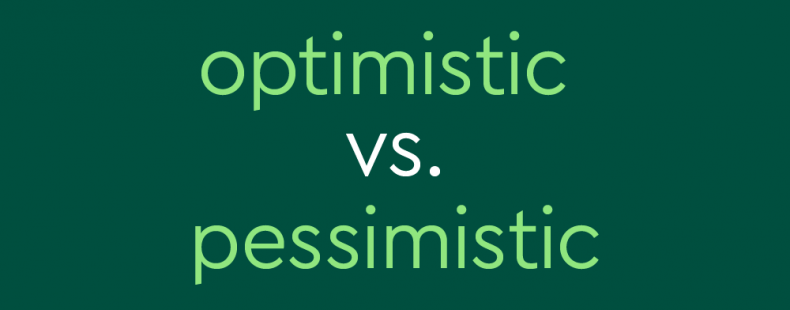Glass half full, or glass half empty? Looking on the bright side, or expecting the worst? Rose-colored glasses, or Murphy’s law? The words optimistic and pessimistic are opposites used in the context of people’s general outlooks or their sense of whether a situation will turn out positively or negatively.
In this article, we’ll define both words—as well as the related nouns optimism, optimist, pessimism, and pessimist—and provide examples to help you remember the difference. We might even help you recognize if you’re an optimist or a pessimist.
⚡ Quick summary
To be optimistic about a situation is to expect it to turn out in a good way. If you’re generally optimistic, you’re an optimist—you tend to look at things favorably. Pessimistic means the opposite: expecting a situation to turn out in a bad way or being a pessimist—always expecting the worst.
What does optimistic mean?
Optimistic means “taking a favorable view of events or conditions and expecting the most favorable outcome.”
A person can be optimistic about a particular situation, as in I’m feeling optimistic about my chances of getting this job. A person can also be generally optimistic, as part of their personality—they’re always looking on the bright side and expecting things to work out for the best. Such a person can be called an optimist.
Optimism is a generally positive outlook—viewing the glass as half full. Plans, views, and other things can be described as optimistic to indicate that they reflect optimism. For example, you might say, Our most optimistic timeline involves finishing the project in just three months or The estimates proved to be too optimistic—profits were only half of what they were expected to be.
On a cloudy day, a person who’s being optimistic might say At least it hasn’t rained yet—and maybe it won’t rain at all. A generally optimistic person expects to win a coin flip.
What does pessimistic mean?
Pessimistic means “taking an unfavorable view of events or conditions and expecting an unfavorable outcome.” A person can be pessimistic about a specific situation, as in I’m pessimistic about our chances—I just don’t think there’s any way for us to win. If a person is pessimistic in general, they can be called a pessimist.
Some people might resist being labeled as pessimistic and instead argue that they are simply being realistic—basing their outlook on reality and what they think will actually happen, even if it sounds very negative.
Just like with optimistic, you can describe outlooks, assessments, plans, and other things as pessimistic, meaning that they indicate pessimism, which is a generally negative outlook—viewing the glass as half empty. Our most pessimistic timeline involves finishing the project a full year after the deadline or The estimates proved to be too pessimistic—losses were not nearly as bad as they were expected to be.
On a cloudy day, a person who’s being pessimistic might say It’s probably going to rain. A generally pessimistic person expects to lose a coin flip.
Where do optimistic and pessimistic come from?
The words optimism and pessimism are first recorded in the 1700s. Optimism ultimately comes from the Latin optimus, which means “best” and is the superlative form of the Latin bonus, meaning “good.” The word pessimism was modeled on optimism and is from the Latin pessimus, meaning “worst,” a superlative form of malus, meaning “bad.”
What is the difference between optimistic and pessimistic?
Optimistic, pessimistic, and their related words are all about different views of the same situation: being optimistic is seeing the glass as half full, and being pessimistic is seeing the glass as half empty.
Remember, an optimistic person expects good things to happen—maybe even an optimal outcome. A pessimistic person expects bad things to happen. The word pessimistic doesn’t have a nice, neat mnemonic to help you remember its meaning—which is exactly what a pessimistic person would expect.
Examples of pessimistic and optimistic used in a sentence
Let’s take a look at some examples of how optimistic and pessimistic are commonly used.
- Hakeem is always optimistic—no matter what the situation, he always expects things to turn out all right in the end.
- His speech was generally optimistic and mostly highlighted good news.
- Daisy’s pessimistic personality often led her to prepare for the worst.
- His pessimistic forecast for the industry predicted significant declines.
- While Quinn was usually optimistic about life, their recent bad luck made their outlook take a pessimistic turn.














